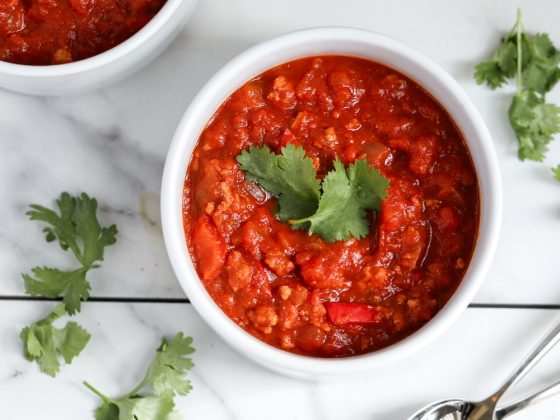If you’re looking to incorporate more plants in your diet, you may want to consider a flexitarian lifestyle. This is exactly what it sounds like –– you’re a “flexible vegetarian” who enjoys animal products in moderation, such as meat and eggs. You may be hesitant to live flexitarian fearing a lack of flavor, but this diverse diet actually exposes you to a lot of nutritious, yet delicious food.
What is the Flexitarian Diet?
The Flexitarian Diet was first developed nearly a decade ago by registered dietician Dawn Jackson Blatner in her book, The Flexitarian Diet: The Mostly Vegetarian Way to Lose Weight, Be Healthier, Prevent Disease, and Add Years to Your Life. She has taught flexitarian eating to thousands of clients over the years and has seen tremendous health benefits and an improved quality of life.
“The Flexitarian Diet guides you gradually to a casual vegetarian lifestyle that is flexible enough to include all of your favorite foods. This inclusive diet does not focus on taking away foods but adds new foods to those you already eat,” she says in her book.
When it comes to adopting a Flexitarian Diet, here are some of the key principles to focus on:
- Incorporate more fruits, vegetables, legumes, nuts, and whole grains into your meals.
- Include more protein from plant sources, instead of just animal sources.
- Eat foods that are least processed.
- If you’re craving something sweet, try whole foods with natural sugars instead of foods with added sugars.
There are no set calories or specific goals on a Flexitarian Diet –– the goal is just to eat more plants than animal products. As Blatner describes in her book, it is a “liaison between the standard American diet we all enjoy and the healthier, more alternative vegetarian lifestyle.”
What are the benefits of the Flexitarian Diet?
Plants have been revered for their powerful benefits to optimize health. A study published in Translational Psychiatry suggests that a plant-based diet drives weight loss, reduces systemic inflammation, and prevents the onset of chronic diseases. The Flexitarian Diet includes all of these life-changing properties and will mold it according to your lifestyle –– instead of you having to follow a specific pattern or metric.
- Improved Heart Health
Research suggests that people who eat a plant-based or plant-forward diet have a reduced risk of developing heart disease. This is attributed to how the Flexitarian Diet has less total and saturated fat, more fiber, and more antioxidants to reduce inflammation, according to studies. One study published in the Annals of Internal Medicine found that the LDL (bad) cholesterol levels dropped almost 15 points four weeks after eating a Flexitarian Diet.
- Lower Risk of Diabetes
Diabetes is a lifestyle disease, which can generally be caused by a poor diet and lack of exercise. However, the good news is that a low-sugar, plant-based diet can decrease your risk of developing diabetes and its complications. A study published in Diabetes Care found that 43% of people were able to decrease their diabetes medication after adopting a plant-based diet in a 22 week study.
- Lower Risk of Cancer
Plants produce phytochemicals that protect cells from damage, preventing chronic diseases like cancer, according to the Mayo Clinic. Not only do phytochemicals protect cells, but also “stop the progression of tumor growth and slow biochemical signs of aging,” says Blatner in her book. These essential compounds are only found in plant-based foods such as fruits, vegetables, beans, nuts, and whole grains.
- Increased Life Expectancy
Research has shown that a Flexitarian Diet can help you live a long, healthy life. A study published in American Journal of Clinical Nutrition found that semi-vegetarians live on average 3.6 years longer than non-vegetarians.










